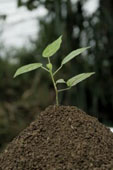
Purpose
To observe how seeds germinate and be able to answer the question, “Why do seeds need wet soil to germinate?”
Additional information
A young plant forms inside a seed. Under the right conditions, the seed will grow into a new plant. When a seed starts to grow, the root appears first. As the seed coat falls off, the first pair of laves appear. Then the stem grows and more leaves appear. The cotyledons become smaller and smaller as the plant grows. The cotyledons supply the food that the young plant needs. As more leaves appear, the food in the cotyledons become less and less until it is used up by the young plant. By the time the cotyledons fall off, the young plant can already make its own food. This first stage in the growth of a young plant from a seed is called seed germination. In order for germination to take place, there are many factors to consider including its needs. Just like any living thing, seeds when germinating must be provided with food, sunlight, and water.
Sponsored Links
Required materials
- 2 glass jars
- wet soil
- dry soil
- 10 red beans seeds
Estimated Experiment Time
10 minutes to prepare set up and five days for observation
Step-By-Step Procedure
- 1. Get two glass jars.
- 2. Put wet soil in the first glass jar and label it A.
- 3. Put dry soil in the other glass jar and label it B.
- 4. Plant 5 red beans seeds in glass jar A.
- 5. Plant also five red beans seeds in glass jar B.
- 6. Place both glass jars in an area where there is sunlight.
- 7. Observe them for five days.
Note
In order to have accurate results, make sure that the soil in glass jar A is wet by pouring water evenly. It is also important that your soil in glass jar B is completely dried. Moreover, plant the seeds correctly so that they will grow.
Observation
What happened to the seeds in glass jar A? How about in glass jar B? In which setup did the seeds grow? Why didn’t the seeds grow in B? What do germinating seeds need in order to grow?
Result
After five days, the seeds in glass jar A begin to grow. Roots begin to appear and the seed coats begin to crack. The seeds in glass jar B did not grow at all. The seeds look dry and they become wrinkly. They did not grow because there was no moisture found in the soil since it is dry. The experiment showed that germinating seeds also need water in order to grow. There is moisture in wet soil. Before a seed germinates, it absorbs moisture from the soil. There are also minerals in the soil. The seed also absorbs minerals from the soil. Seeds germinate when the conditions are favorable. A favorable condition means there is enough moisture, minerals and the right temperature.
Sponsored Links
Take a moment to visit our table of Periodic Elements page where you can get an in-depth view of all the elements,
complete with the industry first side-by-side element comparisons!